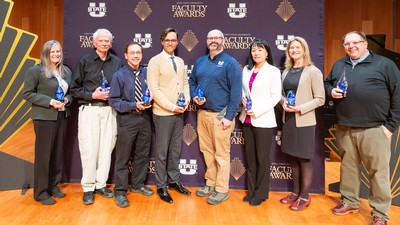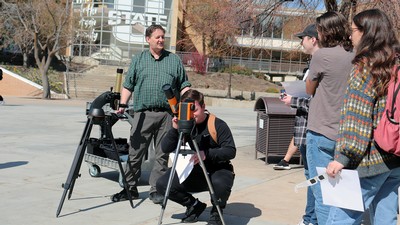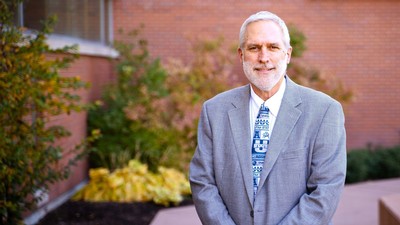The CHaSSie Film Festival: Recognizing Today's Writing Needs, Plus Popcorn
There’ll be popcorn, red carpet and flashing cameras. Winning cinematographers will show off their statuettes (the CHaSSies). The tuxedoed emcee will politely applaud.
Plan for all that and more at the first-ever CHaSSies Three-Minute Video Film Festival at 4 p.m. Thursday, March 1. CHaSSie winners will be announced at the ceremony, which is hosted by the English Department and sponsored by the College of Humanities and Social Sciences. The premiere screening will be held at the Eccles Conference Center, room 205-207, with emcee Joseph Ward, CHaSS dean. It is free and open to all.
The CHaSSie awards, which organizers plan to make an annual event, comprise four categories: humor, documentary and hobbies, as well as an open category. Festival organizers are three English faculty colleagues, Lynne McNeill and Jared Colton, assistant professors of English, and John Engler, senior lecturer in English.
McNeill said it was the perception that “CHaSS students are often not recognized for their digital and technological prowess” that inspired the three to organize the festival.
In the end, however, more than 20 videos were submitted by students in disciplines throughout the university, from theater arts and marketing to biological engineering and dietetics.
English is well represented among CHaSSie competitors, though, and the judges came from English faculty and staff. In fact, says McNeill, the organizers’ first impulse was to call the awards the “Ray Bees,” thinking of the English Department’s location in Ray B. West Building. Thankfully, that didn’t happen.
Video is merely an evolution in writing, says McNeill, and many English classes have abandoned what she describes as “old school forms of essay writing and reports.”
Today, adds Colton, “we conceptualize writing as much broader than the traditional. We think of writing in web design, document design and videos. We can see many of the things we learn about writing playing out in videos.”
Students who are pros at social media often don’t associate their thumb-racing with formal writing, said Colton, who reaches technical writing. “They’re shocked” to learn they’ll be going beyond the five-paragraph essay, he adds. “But usually by the end of the class they’re like, ‘I love that this was part of English’. Or, ‘This is humanities? This is so cool.’”
McNeill points to the paradox now faced by faculty members who teach communication. “We’re at an interesting, in-between point societally, where there’s still enough people around who are old enough to see social media as a fringe thing. But now it’s a necessary part of every business, promotions, outreach, anything. It’s a skill set that students need to learn.”
Related links: https://english.usu.edu/film/fest
Contact and writer: Janelle Hyatt, Janelle.hyatt@usu.edu, 435-797-0289
Comments and questions regarding this article may be directed to the contact person listed on this page.





